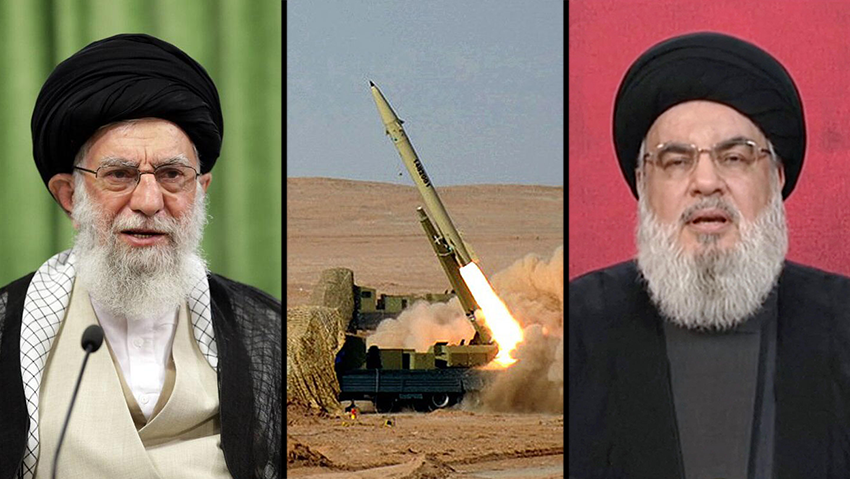Getting your Trinity Audio player ready...
If there was a secret WhatsApp group coordinating between Hamas, Hezbollah and Iran, its members would undoubtedly be rubbing their hands in satisfaction, marking another success in the goal set by Iran for Hezbollah at the outset of the terror attack on Israel: attrition and patience.
Weeks after the assassination of Hamas leader Ismail Haniyeh in Tehran and Hezbollah military chief Fuad Shukr in Beirut, the Israeli discourse remains dominated by the psychological warfare being waged by the enemy. This ongoing campaign is marked by a frenzied cycle of anxiety and panic, spurred by the elimination of these top terrorists.
Just as in April, high-ranking officials, politicians' warnings, and media headlines continue to fuel the panic, constantly offering new predictions for when the enemy will strike. These predictions are debunked the next day, but that doesn’t stop commentators from setting new dates for the impending attack, further amplifying the public’s anxiety.
Hezbollah appears to be perfectly executing its strategy of attrition and patience as part of its broader plan to destroy Israel. Ten months after they began shelling the north, concurrent with Hamas’ massacre in the south, nearly 100,000 residents remain displaced from their homes along the Lebanese border, with hundreds of thousands more living under fire, essentially as hostages.
The Israeli public is worn out and terrified by media reports of what the enemies might do next. Meanwhile, Hezbollah and Iran have no reason to escalate the situation; as long as they can keep us on edge, preoccupied with guessing their next move instead of demanding a preemptive strike, they have no incentive to change their approach. A few heavy bombardments could severely damage Iran’s key facilities, such as the Bandar Abbas port or refineries – an action that would clarify our intentions to continue living here and remind Iran of its vulnerability.
On Sunday, as the Tisha B’Av fast began, the news adapted to the expected events of the day, updating predictions based on "regional sources" and follow-ups to international media headlines claiming Iran’s revenge would come within 24 hours. A day passed, and those predictions were replaced by new ones about when the blow would land on us. Israelis are bewildered. The anxiety has become a constant. And in Iran? They watch, enjoy – and smirk.
In addition, Monday's headline in the British Financial Times added to the panic but also revealed the truth behind it. According to the report, an Iranian source said, “The attack could happen tonight – or not at all.” And that’s the truth. Much like Hezbollah’s declared strategy, Iran understands that the psychological aspect of Israel’s destruction is crucial.
“Waiting for death is much harder than death itself,” the source told the British paper. “Iran has launched a psychological warfare campaign to keep Israel’s military, security, and logistical capabilities on edge—and to prevent the population in the occupied territories from feeling at ease.”
 Yair Kraus
Yair KrausThe collaboration between the media, pundits, politicians and social media fake news groups with the psychological terror that Iran and Hezbollah are waging against us is utterly reckless. This isn’t speculation or a report based on hidden sources; it’s a fact: the enemy has no immediate need to attack and halt this frenzy of panic. As long as we remain tense and on the edge, there’s no reason for them to stop the campaign with a strike our pundits predict will come tomorrow – if not yesterday.
In the past two weeks, since October, what should concern Israeli citizens is not the fear of the blow we might receive but the worry that neither the government nor the military has the courage to deliver a preemptive strike. For two weeks, just like in April, the defense establishment has been focused on bolstering protective measures to the brink instead of completing the offensive blow. They’re waiting for the enemy to strike us, and then maybe they’ll respond.
Just as Prime Minister Golda Meir faced the question of whether a preemptive strike was necessary on the eve of the Yom Kippur War, Netanyahu is now faced with the same question. U.S. envoy Amos Hochstein is expected to arrive in Lebanon tomorrow in another desperate and futile attempt to persuade Hezbollah to sign a cease-fire agreement. He refuses to accept that there is no partner on the other side and is trying to fulfill a dream in the form of a worthless piece of paper.
In time, he may achieve his goal because Hezbollah needs this document signed by the UN just as much as Hochstein does. Hezbollah hopes to serve the main course, as they believe, at a time of their choosing, after they’ve recovered from the wounds inflicted by IDF strikes in recent months. Only then, when they’re ready for the attack, and we’ve returned to dreaming of Tuscany in the Galilee, will they break through and conquer. We cannot wait for that.




